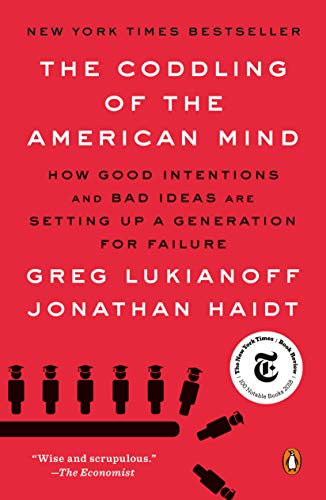The Coddling of the American Mind
How Good Intentions and Bad Ideas Are Setting Up a Generation for Failure
Greg Lukianoff; Jonathan Haidt
BOOK REVIEW

In a world increasingly characterized by sensitivity and avoidance, The Coddling of the American Mind leaps forth like a clarion call to arms. Authored by Greg Lukianoff and Jonathan Haidt, this audacious examination of modern American culture confronts the whirlwind of psychological fragility created by well-meaning social movements. The duo delves deep into the heart of the matter, unearthing how "good intentions" paired with misguided ideas have conspired to set an entire generation on a precarious path toward failure. 💥
This book is not simply an academic dissection; it's a visceral exploration of the delicate fabric of society and the alarming trends that threaten our foundational principles. The authors argue that a combination of overprotection, heightened sensitivity, and the popularization of concepts like "safe spaces" and "trigger warnings" are cultivating a generation so cocooned in their comfort zones that they are ill-equipped to confront the real world. The implications are staggering. Here, the reader is compelled to face the uncomfortable truth: by coddling the youth, we risk stunting their emotional and intellectual growth.
Lukianoff and Haidt weave a narrative that stirs the blood. They employ the sharp blade of logic to dissect contemporary society, illustrating their points with poignant anecdotes and rigorous research. It's impossible not to feel a rush of indignation and concern as they lay bare the evidence - that rather than preparing young minds for the challenges of adult life, we are ushering them into a state of perpetual fragility.
In the chapters, expect to grapple with the concept of "thought distortions," which the authors argue are becoming more prevalent and pronounced among the younger generations. These thought distortions often lead to a warped view of the world, one where perceived threats loom larger than they do in reality, fostering a culture that prizes emotional responses over rational discourse. This is where the authors call for a renaissance in resilience, advocating for the teaching of critical thinking and emotional fortitude. You will find yourself nodding in agreement, perhaps even rising from your seat, energized by the authors' urging to embrace discomfort as a pathway to growth.
The ripple effects of their arguments are as expansive as they are profound. As you read on, you'll be introduced to the idea of "anti-fragility," a concept that transcends the mere notion of resilience. It champions the ability not just to withstand stressors but to actually thrive amid adversity. In a time when the battle between free speech and political correctness feels relentless, the authors position this idea as a guiding star through the stormy seas of social discourse. 🌊
Yet, the book does not shy away from controversy. Dive into the comments and sentiments of readers, and you'll find that responses are as polarized as they are passionate. Some praise its bold insights, reveling in the clarity it sheds on the issues of mental health and education today. Others dismiss it outright, branding it as an attack on progressive movements and a misunderstanding of necessary social reforms. This clash of opinions underscores the very dilemma the authors grapple with: navigating a world that often sacrifices truth on the altar of sentiment.
The gripping reflections on how overprotection can undermine the ability to engage with ideas that challenge or provoke are particularly striking. Readers are called to recognize the dangers of intellectual homogeneity that can stifle innovation and thwart healthy dialogue. Those immersed in academia, social justice, and psychological fields will find this exploration a necessary examination of their beliefs and practices. The stakes are high, and the time to act is now.
Lukianoff and Haidt urge us to regenerate a culture of debate, resilience, and, yes, even discomfort. They advocate for discarding the delicate armor we've bestowed upon our youth in favor of equipping them with the tools necessary for flourishing in an unpredictable world. This call to action resonates strongly in a society where the political and cultural discourse seems ever more fractious and divided.
Ultimately, The Coddling of the American Mind is not merely a critique; it's a manifesto for positive change aimed at a generation already in the throes of existential crisis. This book possesses a power that extends beyond the pages, leaving you with a profound sense of urgency and responsibility. You'll be compelled to reflect deeply, and you may find yourself wondering about your role in this unfolding narrative. 💡
So, will you choose to remain in the warm embrace of comfortable ignorance, or will you step boldly into the storm and engage with the world as it is? The choice is yours, but the journey toward resilience, understanding, and ultimately, enlightenment begins with a single act of courage: reading this book.
📖 The Coddling of the American Mind: How Good Intentions and Bad Ideas Are Setting Up a Generation for Failure
✍ by Greg Lukianoff; Jonathan Haidt
🧾 352 pages
2018
#coddling #american #mind #good #intentions #ideas #setting #generation #failure #greg #lukianoff #GregLukianoff #jonathan #haidt #JonathanHaidt